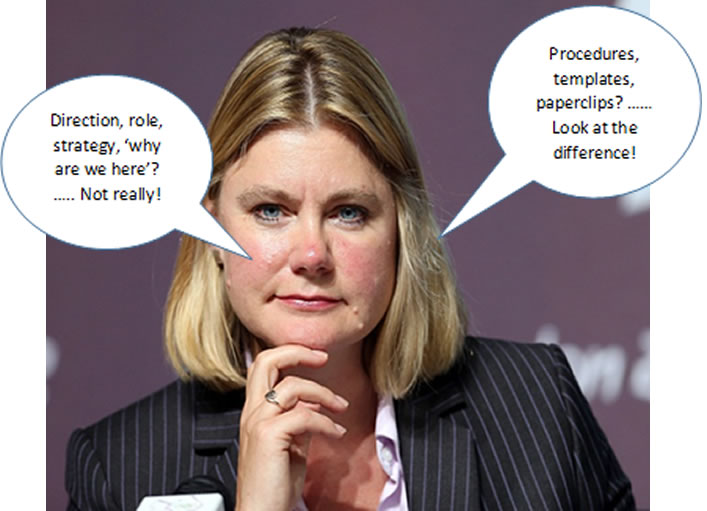Cracks in the DFID facade

Greening the accountant makes her mark
More signs that the DFID edifice is creaking. First, instead of providing a platform for renewal, the launch of its new operating framework – Smart Rules: Better Programme Delivery – has only focused attention on the depth of DFID’s malaise. The Smart Rules are a new set of rules, standards, principles and templates guiding DFID operations throughout the whole programme cycle from design and delivery to governance. Its 37 rules and 10 principles replace the previous 200 compliance tasks and DFID see it as a big improvement and as evidence of major organisational change. Its arrival has been accompanied by skippy supportive comment on blogs from DFID staff “I frequently hear people in meetings these days saying – ‘in the spirit of the Smart Rules, let’s do this (sensible) thing rather than the alternative (silly but in line with old regulations) option!”
But the Independent Commission for Aid Impact (ICAI) has a different take. In its Rapid Review of the Smart Rules it damns DFID with the faint praise of progress on “procedural simplification” before setting out a series of more basic weaknesses (on, for example, value for money, sustainability and learning) the most serious of which, as ever with ICAI, requires interpretation.
ICAI say: “The Smart Rules have been the first part of the wider transformation agenda. Beginning with rule changes is not ideal. It would have been better, from the start, to have the Smart Rules change as one element of a wider programme of cultural transformation ….. setting a new vision, redefining leadership and accountability and building capabilities for key elements of the change”.
What it means: Why are you mucking around with processes and paperwork when you don’t have a credible view on your role or of what you’re there to do, your capacity is weak, culture ghastly, and ethics questionable? Sweating the small stuff
while you’re strategically adrift may be within the alarmingly limited comfort zone of your accountant leader (Greening) but it guarantees your failure as a development agency.
Second comes news from the DFID Alumni Association of disquiet within their ranks over goings-on at their ex-employer. Prompted by the Chambers savaging (see opposite), this extract is from a recent e-mail exchange between members:
“I do question what was the point of all the millions wasted, especially in the early/mid 00's? As a true civil servant, I had to zip it and cry into my beer!”
“Insiders variously describe DFID to me as “a juggernaut out of control", "a massive spending organisation", "any one questioning outturns is ignored or sidelined".
“When we used to ask NGOs if they needed more aid they refused it as they did not want to be accountable to us. Now they get massive aid and can afford huge salaries and all sorts of activities which many would challenge do much for the poor”.
“The figures which DFID Ministers put out about the millions of poor people benefiting are simply not credible”.
“Is no one prepared to blow a whistle? In many countries aid is distorting exchange rates and hotel prices and talented Africans rush to join NGOs. One not only has a loyalty to the organisation one works for but to the poor in developing countries and our own taxpayers”.
“We need a better smaller quality aid programme”.
INTERNAL NOTE TO DFID STAFF FROM LEADER GREENING
Smart Rules make DFID one of the world’s great belief systems
All of you now will have received your signed copy of our Smart Rules guidelines and will have spent time in group chanting sessions with your colleagues. As you read, discuss and chant, it’s important to remember three things.
1. The new rules put us right in the mix with other comparable great schools of thought. Christianity has 10 Commandments, Islam has its 5 Pillars, Hinduism has 5 Principles, Buddhism has 8 Precepts, while Dante had 9 Circles of Hell and Eddie Cochrane 3 Steps to Heaven. Now that we have 37 Rules and 10 Principles we at last have the tight belief system that reflects our importance.
2. Some staff have asked whether we should now officially refer to DFID’s pre-SMART era as STUPID? The sentiment behind this reaction is sound but we shouldn’t be rigidly fundamentalist in our position. So I won’t support open chastisement of relics from the STUPID time - after all, they knew no better! However, mild snorts of derision, gentle eye rolling, sad head-shaking…. these are all appropriate SMART responses.
3. You’ll be aware of our nemesis ICAI’s (typically) lukewarm comments to the effect that the Smart Rules paper over cracks in strategic role, mission and culture/capacity. In response, we really have to show that our personality and behaviour change is REAL. In this regard, I see the morning departmental principles-chanting sessions – we are professional, proportionate, transparent, responsible etc – as serious and important. We need passion and sincerity in our chanting. Giggling is therefore not appropriate (especially over the ‘evidence-based’ principle).
Development’s last honest man?
 At a time when it is increasingly hard to find genuinely independent analysis of the aid machine, untainted by narrow self-interest, Robert Chambers’ recent slamming of the state of DFID is a refreshing change. It is not the normal practice of DevBalls to endorse, enthusiastically, a new piece of writing – but this is different. “Perverse Payment by Results: frogs in a pot and straitjackets for obstacle courses” is about the specifics of Payment by Results (PbR) and its “cruelly perverse effects”, but really is a much more fundamental critique of the DFID jamboree and the demise of development ideals, including:
At a time when it is increasingly hard to find genuinely independent analysis of the aid machine, untainted by narrow self-interest, Robert Chambers’ recent slamming of the state of DFID is a refreshing change. It is not the normal practice of DevBalls to endorse, enthusiastically, a new piece of writing – but this is different. “Perverse Payment by Results: frogs in a pot and straitjackets for obstacle courses” is about the specifics of Payment by Results (PbR) and its “cruelly perverse effects”, but really is a much more fundamental critique of the DFID jamboree and the demise of development ideals, including:
The erosion of the DFID staff resource – “more managers have been recruited with no experience”
The absurdity of DFID processes – “DFID funding has increasingly become a dysfunctional demoralising nightmare”
The distortions from spending pressures – “DFID is proud of meeting its spending targets! Who recognises that not spending budgets can be an indicator of participation and empowerment? That it is good to save money?”
The distortion from the measurement straitjacket – “Targets have become more rigid, measurement has taken over from judgement, linear Newtonian thinking and action denies and obliterates non-linear realities”.
The distortion of incentives – “Incentives can be perverse incentives to report results. Shoddy work, do what the numbers demand, never mind sustainability, ownership, empowerment – you can’t measure those so easily”.
Chambers, now a Research Associate with the Institute of Development Studies (IDS), has long been a distinctive and influential voice, but this may be his finest hour. His analysis is timely, fearless and true – the unspoken truth that any considered mind in the development world will recognise but most (nearly all) seem to find ways of rationalising and remaining silent over.
Of course, perhaps it is easier to be fearless when you command the respect that Chambers does. Perhaps. And his analysis is redolent of a more innocent, idealistic time which, in an environment shaped by the pressures of politics and money, doesn’t apply now. Chambers’ view of incentives (“They work in development because they actually care and want to make a difference”) and his dismissal of money as an incentive (“insulting view”) fails to recognise the cultural change that has emerged in this more moneyed era. Money is the name of the game – how big is your budget, how big is your salary. In some of DFID’s target countries, the salary/rates binge has a hint of prima donna footballers, puffed up with self-importance and market value.
And this – in the UK at least – is a direct consequence of the inflated budget and the cynical manipulation of development for political ends which together have changed the rules of the development game, and are manifested in the myth of the 0.7% spending target. Chambers asks:
“What is going on? How far will this go? At what gratuitous cost to the people living in poverty, and diminished cost-effectiveness of our taxpayers money? Is this what we had in mind when we campaigned for 0.7%?”
No Robert, it wasn’t. But it is – unavoidably - what we’ve got.
Snouts in the trough on the poverty front line
Cosiness and conflicts: while other government departments are more vigilant over potential conflicts of interest between civil servants and contractors, standards seem to be a tad loose at DFID. From the world of DFID Research, come two examples from DevBalls readers.
The Budget Strengthening Initiative (BSI) is a £6m project managed by ODI. Until recently, it was directed by the same individual who, then as a senior DFID civil servant, conceived and developed the project idea, before ‘giving it’ to ODI to subsequently present to DFID (successfully) for funding.
The DFID Building Capacity to Use Research Evidence (BCURE) programme is managed by an individual who previously worked with INASP, a development research NGO. One of INASP’s largest projects is VakaYiko which is funded under BCURE and where the funding award was granted after the ex-INASP staff member joined DFID.
DFID’s new all-embracing rule book, Smart Rules, states that “conflict of interest arises when an individual could be, or is, influenced by personal considerations in the course of doing their job”.
Good to have this clarity – that will obviously make sure that it never happens in DFID.
Promises, shovels and Orwellian abbreviation: the practical consequences of DFID’s spending promises are coming home to roost. At the end of 2013, after a hasty re-calculation of figures, in order to meet its 0.7% of GDP spending pledge, DFID found itself with eight weeks to get rid of £1bn extra money.

Luckily for it, there are numerous multi-lateral budget black holes into which funds can be shovelled – which is where it ended up.
It is less clear how this kind of panicky, get-it-out-there spending binge can be reconciled with DFID’s oft-repeated VfM doctrine – which suggests at least a modicum of analysis and planning (or indeed, what other cut-to-the-quick spending departments might thing of this latest DFID wheeze). Unless, of course, the whole VfM ‘thing’ is, as unkind observers have suggested, a political and bureaucratic charade to hide DFID’s worsening ‘haven’t-a-clue’ decline? Or some ironic quasi-Orwellian reference? Or perhaps shovels are, in fact, unheralded but vital tools in DFID’s whole VfM strategy?